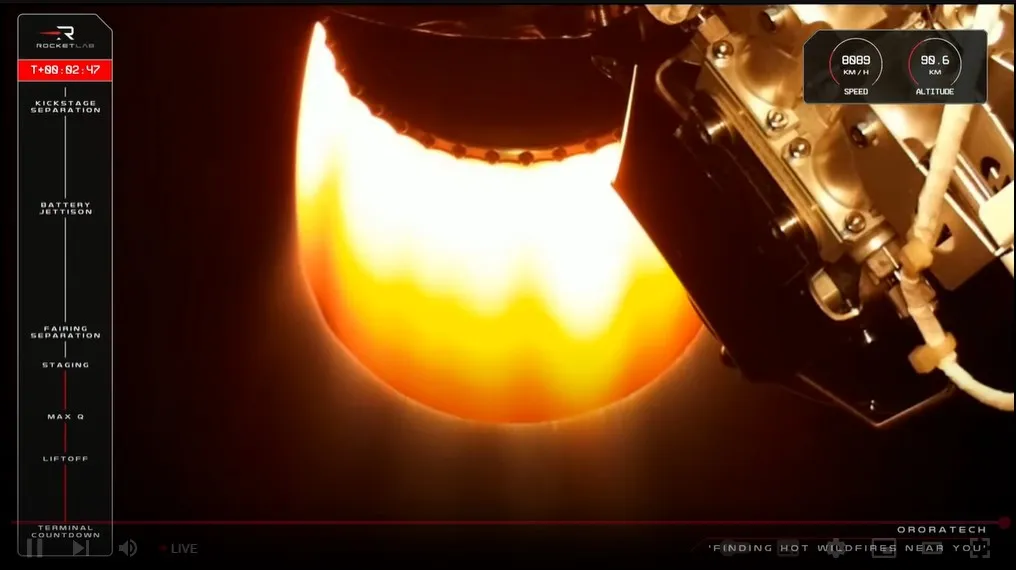Rocket Lab Launches 8 Wildfire-Hunting Satellites into Orbit from New Zealand

Electron's second-stage Rutherford engine propels the rocket to orbital speeds. (Image credit: Rocket Lab)
In a significant step toward bolstering global wildfire detection, Rocket Lab successfully launched eight wildfire-hunting satellites into orbit on March 26, 2025, from its launch facility in New Zealand. The mission, dubbed “Finding Hot Wildfires Near You,” lifted off at 11:30 a.m. EST (4:30 a.m. NZT on March 27) from Launch Complex 1 on the Mahia Peninsula, marking the company’s fifth launch of the year and its 63rd Electron rocket mission overall.
The satellites, developed by German-based company OroraTech, were deployed into a 550-kilometer low Earth orbit with a 97-degree inclination, positioning them to provide near-real-time monitoring of wildfires across the globe. Equipped with thermal infrared cameras and advanced sensors, these spacecraft are designed to detect fire hotspots and deliver critical data to firefighters and emergency responders, enhancing their ability to combat the growing threat of wildfires exacerbated by climate change.
The Electron rocket, a 59-foot (18-meter) small-lift vehicle, executed a flawless ascent, releasing its payloads approximately one hour after launch. The mission showcased Rocket Lab’s rapid-response capabilities, with the launch contract signed just four months prior—a testament to the company’s agility in meeting time-sensitive demands. “This mission is about getting vital technology into space quickly to protect communities and ecosystems,” said Peter Beck, Rocket Lab’s founder and CEO. “We’re proud to support OroraTech’s vision of tackling wildfires from orbit.”
OroraTech’s satellites represent the first phase of a planned constellation that could eventually include over 100 spacecraft. Once fully operational, the network aims to provide continuous, 24/7 coverage, reducing the time between fire detection and response. “These satellites will empower first responders with actionable insights, helping to save lives and infrastructure,” said Thomas Grübler, OroraTech’s Chief Strategy Officer. The company’s technology leverages AI-driven analytics to interpret thermal data, offering a powerful tool in an era of increasingly frequent and severe wildfires.
The launch comes at a pivotal moment, as wildfire seasons intensify globally. From California to Australia, uncontrolled blazes have devastated landscapes and displaced communities, underscoring the need for innovative solutions. OroraTech’s constellation promises to fill a critical gap in early detection, complementing ground-based efforts with space-based precision.
Rocket Lab’s Mahia Peninsula site, a remote coastal location on New Zealand’s North Island, provided an ideal staging ground for the mission. With minimal air and marine traffic, the facility supports frequent launches, a capability that has made Rocket Lab a leader in the small satellite launch market. The Electron rocket, known for its carbon-composite design and reliable Rutherford engines, has now delivered over 200 satellites to orbit since its debut in 2017.
The successful deployment drew praise from both the scientific and space communities, with social media posts on X highlighting the mission’s significance. “Another win for Rocket Lab and a huge leap for wildfire management,” one user noted, reflecting the widespread enthusiasm for the project.
Looking ahead, Rocket Lab has a busy slate of missions planned for 2025, including additional launches for commercial and government clients. Meanwhile, OroraTech is already eyeing the expansion of its constellation, with plans to further refine its fire-detection capabilities. As the satellites begin their work, the collaboration between Rocket Lab and OroraTech stands as a shining example of how space technology can address pressing challenges on Earth—turning the cosmos into a vantage point for safeguarding our planet.